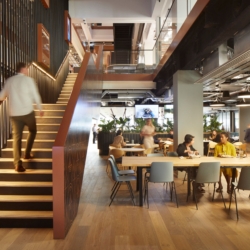April 22, 2024
Hybrid working ‘allows organisations to cut energy use by a fifth’
 Hybrid working has enabled UK businesses to cut energy usage by a fifth as they replace large city centre office space with smaller, more energy efficient spaces including flexible workspaces, according to a new report from IWG, whose brands including Spaces and Regus. surveyed more than 500 leaders and facilities managers at businesses that have adopted hybrid working policies. The findings revealed that average energy consumption in those companies has fallen by 19 percent since the introduction of hybrid working policies, benefiting both the environment and their bottom line. (more…)
Hybrid working has enabled UK businesses to cut energy usage by a fifth as they replace large city centre office space with smaller, more energy efficient spaces including flexible workspaces, according to a new report from IWG, whose brands including Spaces and Regus. surveyed more than 500 leaders and facilities managers at businesses that have adopted hybrid working policies. The findings revealed that average energy consumption in those companies has fallen by 19 percent since the introduction of hybrid working policies, benefiting both the environment and their bottom line. (more…)





































April 4, 2024
When it comes to the carbon conundrum, real change will come from collaboration
by Roger Olsen • Comment, Environment, Facilities management, Property, Wellbeing